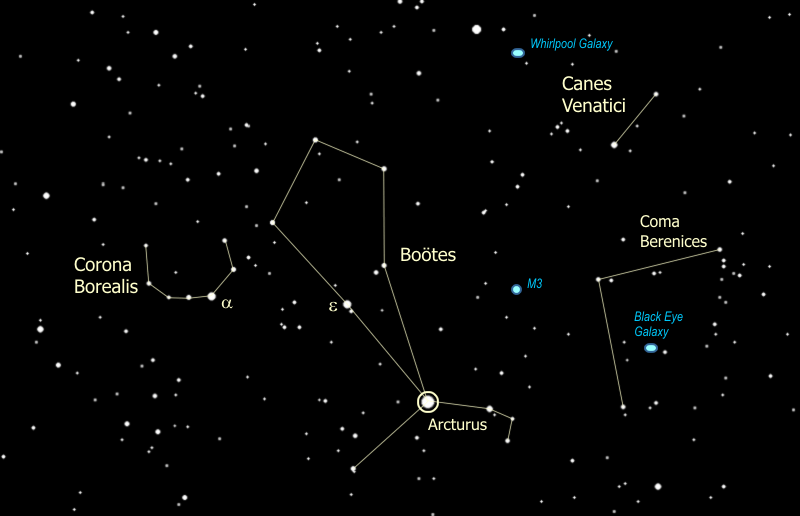
The Constellation Bo÷tes


|
The Constellation Bo÷tes |

|

Arcturus is historically famous for a number of reasons. For example it was used to turn on the lights at the 1933 Worlds' Fair in Chicago. They put a telescope on Arcturus, focused the light down to a photocell which then turned on the lights. The reason they did this is that Arcturus is 40 light-years away from us, and the last time the World's Fair had been in Chicago was in 1893, 40 years prior, so the light they were using to start the World's Fair had left the star at the time of the last World's Fair in Chicago. Cool, huh?
Note to the tourguide: when it gets late in the summer and I can no longer effectively use Spica for star brightness & color, I base it on Arcturus starting with the above story, then proceed as follows: They also used Arcturus because it is so bright. What do you think, is Arcturus the brightest star in the sky? Is there any brighter? (The group will find Vega.) Right, that's Vega, and it may look brighter because it's higher in the sky. Technically Arcturus is brighter but they are virtually the same. -- Then go on to point out Altair & Deneb as 1st magnitude stars & Polaris & Dipper as 2nd magnitude examples, then the whole discussion on magnitudes. I then have the group compare Arcturus and Vega for "anything else that's different" to get to star color. By pointing out yellow Dubhe & blue Alkaid and going on to their exclusion from the Ursa Major moving group I get a nice transition back to Corona Borealis.
Cor Caroli is a member of a huge asterism known as "The Diamond of Virgo", which goes from Cor Caroli to Denebola, the easternmost bright star of Leo, to Spica in Virgo, to Arcturus in Bo÷tes, back to Cor Caroli. See it? Isn't it huge?
The stars of our galaxy are formed into a rotating disk and are all moving together around the disk. Some stars -- called "halo" stars -- form a dome over the disk, Arcturus is one of those stars, orbiting above and below the galactic center. It is cutting through the disk now, actually a little bit back against the general flow. Someone on a planet orbiting Arcturus would see the entire night sky changing constantly.
 Back to Polar Constellations
Back to Polar Constellations
|
 Go to Summer Index
Go to Summer Index
|
 On to Virgo
On to Virgo
|
Your questions and comments regarding this page are welcome.
You can e-mail Randy Culp for inquiries,
suggestions, new ideas or just to chat.
Updated 17 August 2017